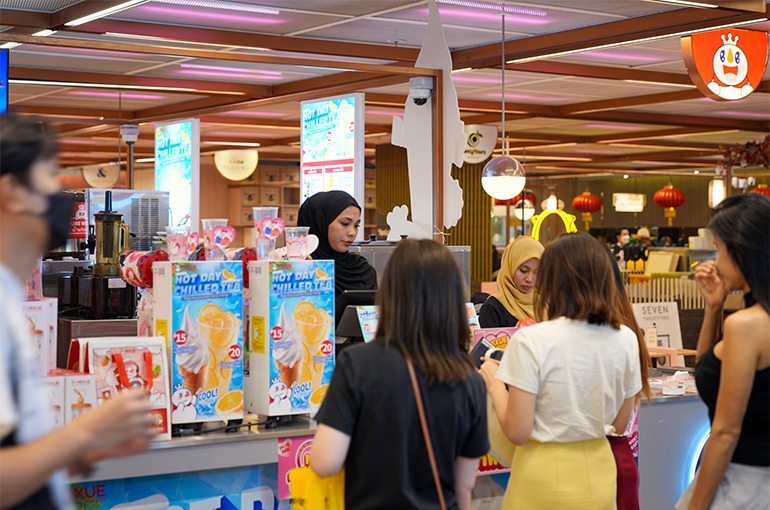 Chinese Tea Chains Target Booming Southeast Asian Market
Chinese Tea Chains Target Booming Southeast Asian Market(Yicai) Aug. 27 -- Chinese tea drink brands are expanding across Southeast Asia due to its large and youthful population, lower operating costs compared with China, and growing consumer spending power. But securing a foothold in the market is not without its challenges.
Ke Rui, 23, opened a 160-square-meter Mixue Bingcheng franchise store in Bangkok, capital of Thailand, with his friends at the beginning of the year at a cost of THB3 million (USD88,200).
"We still haven’t fully recovered the startup costs, but we have stable monthly revenues of nearly THB1 million and a gross profit margin of between 25 percent and 33 percent," Ke told Yicai, adding that the store should recover its initial outlays within the year.
Another Mixue franchisee from China’s Jiangxi province told Yicai that it is almost impossible to recover startup costs within a year in China because the tea drinks industry there is not as profitable as it was in the early stages.
“Recovering startup costs in two years is considered good, but then after two to three years, there are additional costs, such as equipment replacement,” he noted.
Established in 1997, Mixue specializes in freshly made low-priced tea drinks. It had over 36,000 stores as of last September, with about 4,000 located in 11 foreign countries and regions, including Singapore and Japan.
Increased consumer purchasing power has accompanied SE Asia’s economic growth, and with a population of about 670 million people, about half the size of the Chinese market, with more than half aged under 30, it is also a big draw for other Chinese tea drink brands, including Binxi Time, Chagee, China Mengniu Dairy, Ganten, Genki Forest, Nayuki Holdings, Walovi, Want Want China Holdings, and Yili Industrial Group.
Genki Forest, which sells sugar-free sparkling water and tea products, has been actively expanding in Southeast Asia, where Indonesia is one of the company’s main markets. It has partnered with local convenience store chains such as Indomaret and Alfamart as well as major supermarkets, including Lion Superindo and Yogya Group.
“We entered Indonesia in 2022 and now have more than 30,000 retail outlets in the country," Tang Tang, head of Genki Forest's international business, told Yicai, adding that the firm now has comprehensive coverage of the Indonesian market.
Challenges to Navigate
But there are also hurdles to be jumped in establishing a tea drinks business in the SE Asian market, such as adapting to different consumer tastes.
Malaysia and Singapore have relatively high proportions of Chinese residents or descendants who are more connected with tea culture, while Indonesians do not have a strong affinity for tea, preferring sweeter new tea beverages, said Feng Hu, founder of UhooGlobal, a solutions provider to the beverage market.
Thai people also prefer sweeter products, as well as those with more ice, a representative for Nayuki told Yicai.
Chinese companies in SE Asia also face management challenges, according to Maria Yang, the head of the overseas food, beverage, and health product business at Alibaba Group Holding's local e-commerce platform Lazada.
“There have been employees who resigned after just a few days," said Ke. "While some left for personal reasons, others just didn't like the management style of the Chinese team. Thai people tend to separate work and life more easily."
The supply chain is another obstacle to surmount. Countries in the region have different supply chain requirements, said Jiang Huabei, founder of Binxi Time. Some have very strict rules on Halal certification, while others have complex licensing processes with cumbersome procedures, long timelines, and high costs, he added. Thailand, for example, mandates that all food ingredients must be produced in the country.
Editors: Xu Wei, Futura Costaglione